Peter MALONE
Saturday, 18 September 2021 19:25
Seven Hours to Justice
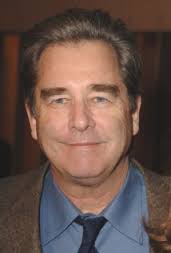
SEVEN HOURS TO JUSTICE
US, 1988, 90 minutes, Colour.
Beau Bridges, Julianne Philips, Ron Liebman
Directed by Beau Bridges.
Seven Hours to Justice is a melodrama about justice in the American courts. One hopes that it is far fetched. The film stars and is directed by Beau Bridges. He seems particularly youthful to be a judge. Julianne Phillips is his wife. Ron Leibman portrays a man, an advertiser on television in a manic kind of way, whose wife is assaulted and died - and there is insufficient evidence in the court for the conviction of her assailants. He takes on a personal, electronic, revenge. The film seems so highly melodramatic that it strains credibility.
1. Impact of this drama: justice, the courts, vengeance? Topical for the 80s?
2. The city locations, the homes, courts, the city streets, the underground, the skid row, the warehouse? Melodramatic score? Special effects?
3. The title, the focus on the issue, vengeance? Justice?
4. The opening with the judge and his dream, tormented, the assault on the woman, his helplessness? Symbol of the films plot? His own life, jogging, his friend the doctor, relationship with his wife? Reardon's special plea and his inability to meet it? The hearing, the defence lawyer, the prosecutor and his lack of evidence? His torment, imagination, having to dismiss the case? The death of the victim? The party, his wife's absence? Abducted, the confrontation with Reardon, Ira and his innocent strength? The commission for the seven hours? The subway token? The bewilderment, anguish, seeing the gang, their brutality, taking everything he owned? The phone calls, the rushing through the subway, in skid row and his torment? Finding the informant, the gun, the evidence? Watched by Reardon? The torment about his wife? The chase by the gang, coming into the warehouse, the confrontations, the deaths? The final confrontation with Reardon and his death? Emerging into safety? The anguish of a judge and his being bound by the law?
5. Reardon - and seeing him as Ravin' Reardon on the television? His outburst to the judge, vigil at his wife's bedside? Her death? His manic revenge, at the party, abducting the Judge, threatening him, giving him a quest, controlling him with surveillance, his going to the house, the encounter with the doctor and killing him? The return with Lisa and Ira? His enjoying the surveillance, the explosives? The gang pursuing the Judge? The deaths? Lisa ruining the machines, his bewilderment, his own death? Driven to madness?
6. Lisa, the judge's wife, lifestyle? Friends in high places? Support of her husband, abducted, tied up, tormented, her trying to persuade Ira to free her? The pigeon, the story of the dog? With the machines - and her kicking them and breaking them? The reconciliation?
7. Ira, slow witted, help from Reardon, loyal to him, confronting the gangs?
8. The gang members, their brutality in the city, the subways? Lack of evidence, intimidating witnesses? The defence lawyer not wanting to have anything to do with them at the end? Hispanic and black? racist tones?
9. The doctor, friendship, helping John, his death?
10. Audience identification with the characters, the issues, justice and the courts?
Published in Movie Reviews
Published in
Movie Reviews
Tagged under
Saturday, 18 September 2021 19:25
Serenade
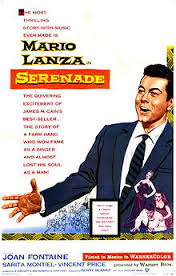
SERENADE
US, 1956,121minutes, Colour.
Mario Lanza, Joan Fontaine, Sara Montiel, Harry Bellaver, Vince Edwards, Vincent Price.
Directed by Anthony Mann.
Serenade is based on a novel by James M. Cain (The Postman always Rings Twice, By Love Possessed). It has been adapted as a wide screen, colourful vehicle for singer Mario Lanza. It was to be one of his final films after his short career on screen, especially at MGM with such films as That Midnight Kiss, The Great Caruso. Lanza is a genial screen presence and has an opportunity to sing many songs and a number operatic arias including Nessun Dorma. The femme fatale acting in a very femme fatale style with posturing and poses and smouldering looks is Joan Fontaine.
Included in the supporting cast is Vincent Price as an entrepreneur. The film is fairly conventional, relying on its being a showcase for its star. It was directed by veteran Anthony Mann, best known for thrillers, later spectacles
and a series of movies with James Stewart, including some significant westerns made during this period.
1. Star vehicle for Mario Lanza? His screen presence? His singing?
2. The San Francisco locations, the vineyards and the fields, the world of restaurants, night society and apartments, opera and rehearsals, theatre? The contrast with life in the village in Mexico, work in the fields? The staging of the opera sequences?
3. The title, the theme song, popular songs, the popular Italian folk songs, the operatic arias?
4. The portrait of Damon Vincente: Mario Lanza style, working, the background of his story with his family, the vineyards? Meeting Kendall, giving her directions? Tonio as his agent, getting him the audition, the cantankerous bar owner his being entranced by his voice? Singing, Kendal and Winthrop present? Winthrop's overtures, taking him to Kendall's apartment, singing for the maestro? Being trained by the Maestro? Being hurried into training, his performances, concerts? The collage of his success? His infatuation with Kendall, her urging him on? Her own callow attitude - and his seeing the experience with the boxer and his anger? The build-up to Othello, performance, make-up, wanting Kendall to be present, her absence, his nervousness, his walking off stage?
5. Kendall, the affluent San Francisco society woman? The initial encounter with the car? Her listening to him, her apartment, the maestro and his debt to her? Her relationship to Winthrop? The interruption by the boxer, the audience seeing him in the car, his prize fight, her absence and loss of interest? Winthrop's story about her childhood - building sand castles for the joy of having them destroyed? the romance? His gratitude to her, infatuations? Her absence Her treatment of Damon from his performance and his collapse?
6. Damon in Mexico, not knowing where he was, his illness, being trapped by Juana and her family? His recovery? Juana tending him, the lack of confidence in his ability to sing? Working with the villagers? The build-up to the festival? His refusal to sing? His gratitude towards the people in the village?
7. Juana, her kindness towards Damon? Her own history, her mother running away, the depth of her father - willing himself to die in the bullring? The background of bullfighting? The festival? Juana's song and dance re-enacting the film? Her boyfriend and his anger, her threatening him with the sword? Her going into the church? Her ability to advise Damon, her inability to help herself? His singing Ave Maria? His departure, driving him, in the storm, relying on him? Their love, the marriage?
8. Going back to San Francisco, the bar, singing, his friends, coming again? Winthrop’s arrival? Boosting him? More modest hopes, the San Francisco opera, the preparations, rehearsals, performance and success?
9. Kendal, her presence at the concert? Damon's uncertainty at her presence? Juana and her trying to get him to face the truth? Not to avoid Kendal? The invitation to the party, Kendal's humiliation, threats to Juana? Their departure?
Juana running out and being hit in the street? Damon's singing - and her recovery?
10. Winthrop as the entrepreneur, sardonic attitude towards Kendal? Supporting Damon? Tonio and his cousin, friendship, agent? Damon punching him in the dressing room? The boss of the bar and his support?
11. The boxer and the sculptor and Kendal using them?
12. Finding genuine love, finding self-happiness?
Published in Movie Reviews
Published in
Movie Reviews
Tagged under
Saturday, 18 September 2021 19:25
Scarlet Street
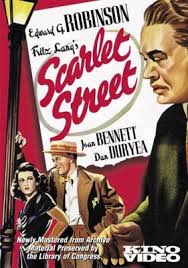
SCARLET STREET
US, 1945, 103 minutes, Black and white.
Edward G. Robinson, Joan Bennett, Dan Dureya, Margaret Lindsay.
Directed by Fritz Lang.
Scarlet Street is a film noir, made by the same group responsible for 'The Woman in the Window', the year before. Edward C Robinson and Joan Bennett star as an ill-fated couple. Dan Duryea is the usual sinister villain. The film was produced by Joan Bennett's husband Walter Wanger and directed by Fritz Lang.
It is a film about evil, a variation on the The Blue Angel theme. A meek clerk pretends that he is a wealthy artist to a prostitute who pretends that she is an actress. They get entangled, the clerk discovers the truth after stealing for her, murders her. The sinister pimp goes to the electric chair for the murder. While the clerk goes unpunished, he is shown at the end being tormented.
The film is a melodramatic portrait of weakness and evil.
1. Film noir, crime thriller, portrait of evil?
2. Black and white photography, light and shadows? New York, the world of Chris, the world of Kitty? The score, the stars, the film in Fritz Lang's canon?
3. The title, the effects of evil?
4. Chris, the anniversary, the speech, the gift of the watch, the ordinary clerk? Adele and her tyranny at home, the apron, the dishes? His enjoying his painting, her criticisms nagging? The party, the drinking, his rescuing Kitty in the street? Escorting her, the gentleman, the cup of coffee? Her lies and his letting her believe what she wanted about him? His charm, her demands for money, his stealing, the setting up of the studio? The irony of Adele's husband turning up and the blackmail? His antagonism towards Johnny? Friendship with, Milly believing Johnny to be her boyfriend? The paintings, painting the carnation, the irony of their going to the gallery, allowing Kitty to have the credit? The discovery of the truth, his employer not sending him to Jail? His seeing Johnny with Kitty, killing her? The trail, his testimony, the train ride to Sing Sing? His ending with wandering the streets, being haunted with what he had done?
5. Kitty on the street, Johnny as her pimp, leading Chris on, the lies about acting, his infatuation, sharing the apartment with Milly? Money for Johnny needs? Squeezing Chris, seductive charm? The outings, the gallery, his explanations? The pricing of the paintings, her taking the responsibility, her portrait being painted? The question of marriage and her refusal, spurning Chris, the love for Johnny, her death?
6. Johnny as a pimp, pressures on Kitty, love for her, antagonism towards Chris, taking the paintings to be priced, the success, the gallery, the commentator? The irony of the trial and his death?
7. The business world, Chris and his meekness, the gold watch, the stealing, the employer letting him go?
8. Adele and her tyranny, the irony of decorated husband, the irony of his disappearance, the blackmail?
9. Milly, her friendship, lending Kitty the dress?
10. Themes of seduction, infatuation, the little man, evil, the consequences?
Published in Movie Reviews
Published in
Movie Reviews
Tagged under
Saturday, 18 September 2021 19:25
School for Secrets
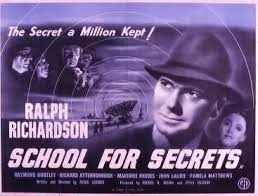
SCHOOL FOR SECRETS
UK, 1946, 108 minutes, Black and white.
Ralph Richardson, Raymond Huntley, David Tomlinson, Richard Attenborough, Ernest Jay, John Laurie.
Directed by Peter Ustinov.
School for Secrets is a post World War II tribute from the British film industry to the Boffins, especially those responsible for the development of radar and night navigation. The film is of interest because it was written and directed by Peter Ustinov (who had done this for Vice Versa and was to do it soon for Hotel Sahara the beginning of a long and distinguished career). Ralph Richardson is at home in the role of the Boffin as is Raymond Huntley as the demanding but petty minded expert. The supporting cast includes John Laurie as the Scottish scientist, David Tomlinson, Richard Attenborough as the pilot. The film re-creates the atmosphere of World War II, gives us something of insight of the scientists who are employed by Britain for the war effort - and their primadonna attitudes and clashing amongst themselves, their vanities. The film has many of Peter Ustinov's humorous and ironic touches in the screenplay. It is also in the style of so many of the patriotic films of the time - a tribute to Britain at war (to be taken up in many bigger budget films of the 50s including the other film about the Boffins, The Dam Busters).
1. Interesting film of the late 40s? Memoir of the war? Tribute to Britain? To the scientists?
2. Black and white photography, war sequences and special effects? Musical score? The very British cast? The quality of Peter Ustinov's writing - serious and humorous?
3. The title, the focus on the secrecy of World War II and the war effort?
4. The background of Britain at war: politics in 1939, the reaction to Hitler’s behaviour and the outbreak of the war? The war effort in the sky? RAF personal? The need for the scientists and their being recruited? Their working in secrecy? Their collaboration, their contributions (and vanities)? The radar, the developments, night navigation, the tests and accidents, the danger of raids into occupied Europe? The achievement in secret? The end and their going to the war effort against Japan?
5. Heatherville and Ralph Richardson's idiosyncratic style? His behaviour in the club and the tension about the lost flight? His work with marsupials? Recruitment, joining the group, personality clashes? Work together, being briefed? Going and boarding with Mrs Arnold? Their life together, achievements, tests? His reaction to Laxton-Jones? His having to go into occupied territory, parachuting, the raid? His return and indication? Their concern about the test and the young scientist and his death? The final achievement - despite fun being poked at him by the
member of his club?
6. The other Boffins and their personalities, Laxton-Jones? and his righteous, petty nature, achievement, keeping fit, sardonic way of speaking, his parachuting, his endless telling of the story? the patience of his wife? McVitie? as the Scotsman, genial, the possibility of flying and the clash with Heatherville? A more genial man? His wife? Telling the news of the death to the scientist wife? The other scientists, their skills, behaviour, clashes, taking credit? Their reaction to the military personal?
7. The military personal, their achievements, decisions, the class structure within the forces? Handling the Boffins? The briefing of all concerned - and democracy within the armed forces?
8. The young scientist, his ambitions, his wife? Going on the test? Their fight and not making up? His death, his wife's grief?
9. Mrs Arnold as hostess, looking after the Boffins, not knowing the truth, her discovery of the truth - and what she might have done? Jack, her young son, the friendship with the Boffins, his flight tasks, the dangers and the parachuting? The return home?
10. The member of the club and his comments about Heatherville and the home guard?
11. A re-creation of the period - and an insight into the events from the vantage point of the immediate aftermath of the war?
Published in Movie Reviews
Published in
Movie Reviews
Tagged under
Saturday, 18 September 2021 19:25
Scene at Sea
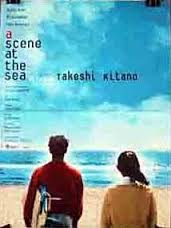
SCENE AT THE SEA
Japan, 1991, 101 minutes, Colour.
Directed by Takeshi Kitano.
Scene at the Sea is the third feature film of actor turned director Takeshi Kitano. (He was seen as the sadistic sergeant in Merry Christmas, Mr Lawrence.) His two previous directorial films were Warning! This Man is Wild (Violent Cop) and Boiling Point. These were action films, almost parodies of the Charles Bronson Clint Eastwood type of police action thriller from the U.S. However, this film is completely different. The film is about young people on the Japanese coast during one summer. A deaf mute garbage collector finds a broken surf board, tries to mend it, begins to surf, eventually buys a board overcomes his difficulties. Meanwhile, the adept teenagers mock him as they sit and watch on the beach. His silent girlfriend, however, accompanies him. She has a moment of jealousy but is devoted to him. A previous expert, now owner of a sports goods store, gives the hero a wetsuit and helps to enter a competition. The ending is particularly downbeat. The film has been made without any gimmicks -
straight forward photography of the sea and the surfing, spare dialogue, no fancy editing. It is quite different from Kitano' previous films. It has a touch of the allegory (and the Japanese surfers are a distinct contrast in manners and courtesy from their contemporary counterparts across the Pacific).
1. A story of young people? Disability and achievement? Allegory for youth?
2. The Japanese town, the coast, the water? The competitions? Surfing - editing? The musical score and choral accompaniment?
3. The title, its allegorical tone?
4. Shigeru, collecting the garbage, his relationship with his co-worker? Finding the surf board, going back, fixing it - and the audience discovering lie could not hear? His girlfriend and her accompanying him, watching devotedly on the beach? His tentative attempts at surfing? The reaction of the other youngsters, laughing at him? His not hearing them? Their trying to get his attention by throwing stones, touching him? His continued practice, neglecting his work, plea by his co-worker to continue the job, urging him on? Buying the surf board, too much money spent - but the extra equipment? The expert and his friendliness, the wet suit? The second wet suit and giving it to the clownish young men? Help with the training? Travelling to the competition? The final competition and his ability? Winning a small trophy? The moment of jealousy with his girlfriend and his not realising it? Going to her house, throwing the stone and breaking the window? The final photos? His going down to the beach - and the girl finding the loan surfboard? The sadness of his death? The collage of memories and photos at the end? A portrait of a young man, disability, overcoming his disability, achievement?
5. The girlfriend, her background, friendship with Shigeru? Accompanying him, carrying the surfboard? Helping buy the new one? Her moment of jealousy with the other girl and the peeling of the fruit? Her eventually coming round? Her grief at the end?
6. The garbage collector, friendship with Shigeru, helping him, persuading the boss to give him the day off? The boss and his understanding?
7. The salesman, giving Shigeru the extra equipment? The higher price, giving him the wetsuit, Helping him train? Accompanying the group for the competition?
8. The comic pair, their awkward attempts, buying the cheap surfboard? The wetsuit, forgetting to register for the competition? Comic touches?
9. The range of young people at the beach, their sedate manner, courtesy? The surfers and their skills? The girls on the beach? The girl with the piece of fruit getting it peeled? The complete contrast to the American scene?
10. A sense of achievement, ordinary people, ordinary situations and transcending them? The dramatic impact of the sad ending?
Published in Movie Reviews
Published in
Movie Reviews
Tagged under
Saturday, 18 September 2021 19:25
San Antonio
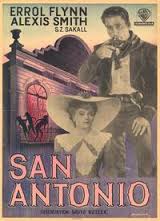
SAN ANTONIO
US, 1945, 109 minutes, Colour.
Errol Flynn, Alexis Smith, S.Z. Sakal, John Litel, Florence Bates.
Directed by David Butler.
San Antonio is a big colourful western from Warner Bros. of the mid 40s. It is the type of movie usually directed by Raoul Walsh or Michael Curtiz. This time it is by David Butler, better known for his comedies and musicals. The film is an Errol Flynn- Alexis Smith star vehicle and they work well with each other. The supporting cast includes many of the Warner Bros. regulars. The film is colourful in its presentation of the town, its presentation of law and order issues and gives Alexis Smith a chance to sing. Nothing particularly new - but entertaining in the golden years of Hollywood style.
1. Entertaining big western of the 40s? Colourful?
2. Warner Bros. production values? Colour photography, the west? Musical score and songs?
3. The title, the focus, the issues of Texas in the 19th century?
4. Clay, in Mexico, in hiding, his friends, persuaded to go back to San Antonio? The cattle? His shrewdness in getting back, accompanying the singer in the coach? Attracted to her - and her later realising the truth? In the town, the support of Charlie? The clashes with the saloon keeper, with the villains and the gun shooters? The intricacies of life in the town, confrontations, the final shoot out? The romance?
5. The singer, the lady entertainer in the west, her entourage? In the coach, with Clay, attracted? Finding out the truth? work in the town, the romance, the rivals? Helping Clay, the ultimate romantic ending?
6. The singer’s entourage, Florence Bates as the haughty Grand Dame, the comic touches? S.Z.Zackal and his usual bewilderment, managing the singer? Out of place in the western town?
7. Clay's friends, Charlie and the other supporters? Helping him into San Antonio, in the confrontations? The murders?
8. The villains, suave and wealthy, manipulating behind the scenes? The sinister presence in the town? The gunfighters? The expected confrontations - and the triumph of the hero over the villains?
9. The popular ingredients of the western, the western hero, heroine, villains? Law and order in the Texas towns of the 19th century?
Published in Movie Reviews
Published in
Movie Reviews
Tagged under
Saturday, 18 September 2021 19:25
Smithy

SMITHY
Australia, 1946, 120 minutes, Black and white.
Ron Randall, Muriel Steinbeck, John Tate, Joy Nichols, Alec Kellaway, John Dease.
Directed by Ken G. Hall.
Smithy was a popular success on its first release in the mid-'40s. It was the last feature film to be made by the prolific director Ken G. Hall. It was to be the last Cinesound feature before the studios moved completely to newsreels.
The film was made by Columbia Pictures and with Columbia's money. Ken Hall chose Kingsford-Smith? as a hero to be remembered and praised after World War Two. The film opens with a war setting and reminiscences about Smithy in World War One and his subsequent career. The film is a typical biography of the period - but stands up quite well. Ron Randall has a boyish charm as Smithy. Muriel Steinbeck is his devoted but concerned wife. Joy Nichols has a very good role as an American girl. There is a guest spot by former Prime Minister, William Morris Hughes as himself.
The film traces Smithy's career as a war pilot, his desire to be an aviation explorer and dramatises his achievements, especially with Charles U1m and John Stannidge. Particular incidents from Smithy's life are passed over very quickly, for example the crash in the Northern Territory and the disastrous search for the missing plane.
Composer Alfred Hill wrote music for the flight sequences over the Pacific. These ought be compared, as could the biography, with Billy Wilder's 1958 The Spirit of St. Louis with James Stewart as Charles Lindbergh.
Smithy, far from being at the beginning of a post-war film industry boom, is something of a postscript to the industry of the '30s and '40s.
1. The quality and achievement of the film? Mid-'40s? Charles Kingsford Smith as Australian hero? Australian history? Morale? The film as a tribute?
2. The work of Ken G. Hall in the '30s? Cinesound studios? Technique, commercial interest? The backing of Columbia Pictures, black and white photography, locations, re-creation of the period? Re-creation of the flight over the Pacific? Over the Tasman and the crisis? The musical score for these sequences?
3. Audience knowledge of Smithy? The '40s and the vivid memory? Later interest? His name becoming famous, the Southern Cross, airports? His achievement, pioneering and aviation skills? The pathos of his death?
4. The '40s and the short time since Smith's death? The setting of 1943 and the south-west Pacific, the Americans, the Australian memoir and tribute? The praise throughout the film and the humorous ironic sequences of the typical Australian Ocker?
5. Smithy in World War one, in flight, battle, achievement, injuries? Recuperation, the nurse, at Buckingham Palace? Sending the Military Cross to his parents? Youthful, hopes, an aviation pioneer?
6. His plans to fly to Australia, the visit of Billy Hughes and lending his authority stop the flight? Kingsford Smith's sense failure, going to the United States, the train trip and the meeting with Kay, becoming friends, the reunions, her support? The lack of funds? Returning to Australia, years of work? The development of air travel in the '20s? Air mail? Defence purposes? His going into business, the work with Anderson? Lack of skills in finance? The success of other pioneers?
7. The arrival of Charles Ulm: the hopes, flying the Pacific? Going to the U.S., meeting Kay again, the contracts, planes, the endurance test to get the money and the failures? Kay and the introduction to Hancock? The funds raised, the build-up to the flight? The long sequences of he flight: photography, dramatic tension? The intercut radio broadcasts and the pessimism? Honolulu, Fiji, flying the Pacific, the Australian coast, Brisbane and Sydney? Arrival and acclaim?
8. Ron Randall as Smithy: age, boyishness, hopes, experience? The background of his parents and family? Work, lack of success, reputation and yet the government not supporting him in enterprises?
9. The encounter with Mary, the autograph, meeting her again, the voyage, the proposal, her father? The wedding? happy, Mary's anxiety, the life, Mary's pleas that he not fly?
birth of the son, their affluent life?
10. The background incidents omitted from the film: the crash in the Northern Territory desert, Ulm's death, flights to and from England, the centenary flight? the presentation of the crossing of the Pacific? The flight of the Tasman and the crisis - especially the transferring of oil from one engine to another on the wing? The radio broadcasts?
11. Smithy and his achievement, getting tired, older? decisions? Illness? People pleading with him not to fly? England, illness, the decision to fly? The final flight, the characters coming back in his memory and flying into the sunrise? their influence on him? glorification of the hero?
12. The film and its presentation of an Australian hero: ordinary, achievement, the knighthood, ambivalent attitudes of government, the buying back of the Southern Cross, family? The sequence with the boys and his envisioning then as flyers of the future? His beliefs? The history of aviation and its development? Qantas? Later decades and the achievement of Smithy?
Published in Movie Reviews
Published in
Movie Reviews
Tagged under
Saturday, 18 September 2021 19:25
Svengali
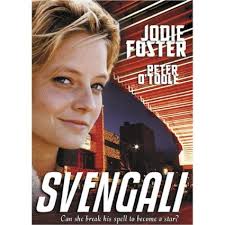
SVENGALI
US, 1983, 100 minutes, Colour.
Peter O’ Toole, Jodie Foster, Elizabeth Ashley, Holly Hunter.
Directed by Anthony Harvey.
Svengali is a update of the classic novel by George Du Maurier. Svengali is the music teacher with hypnotic powers. Trilby is the singer unable to sing without him. This adaptation focuses a former musical comedy star from Europe, who had appeared on Broadway, who has an ability to train the young Zoe. He had appeared in the musical of Svengali - hence the connection.
The film is set in New York City, in the world of popular music. Peter O'Toole uses his eccentric style as the Svengali like teacher who is infatuated with the singer. Jodie Foster gives a solid performance as the singer. The supporting cast includes Elizabeth Ashley as the agent. Holly Hunter can be glimpsed in a small role as Johnny's girlfriend.
The film was directed by Anthony Harvey who directed Peter O'Toole in his Oscar nominated performance in The Lion in Winter. (Previous versions of Svengali came from the 30s with John Barrymore and the 50s in a British production with Donald Wolfit and Hildegarde Neff).
1. Enjoyable story? The contemporary music world? The updating and adaptation of the original?
2. The New York settings, affluence, the music world? The touring concerts? Special effects?
3. The musical score, the songs especially written for the film (by Don Black and John Barry)? The themes for Zoe? The credibility of the Svengali story adapted for the modern rock world?
4. The title, the reference to the classic, the musical version? Anton as Svengali? His friendship with Eve? His career, the collapse of his voice, training singers and his rudeness to the woman who had lessons for 24 years? At the nightclub, disgusted with the rock music? His sardonic comments? Interest in Zoe? Eve introducing them, the lessons, her initial hostility, her return? His interest, lessons and hard training, infatuation? Her proposal, his succumbing to her personality, the affair? The effect on him? Her records, his needing to he there? The discussion about the tour, his not wanting to go? The decision to go, supporting Zoe, his presence during the performance - and the irony that it was someone else? His attempts to make her stand on her own two feet? The falling out, the clash? His return, further students? The finding of somebody else in Zoe' place, the rubbing of his ear? Her visit to him, the planned marriage? The final close-up - and the process beginning again?
5. Jodie Foster as Zoe, at work, friendships, relationship with Johnny, the band, the opportunity to sing, perform for the agent? Her rock'nroll style, strident? Eve's interest, the phone call, Johnny persuading her to go? Her antagonism toward Anton? The drudgery of the lessons? His persuading her, changing her voice? Her success, the audition? The record - her anxiety, unable to sing without Anton's presence? The success of the record, looking at the jacket in the window, meeting Johnny, his asking for a job? Her relationship with him, discovering him with the girl in the apartment? The proposal to Anton, her falling in love, their living together, her wanting to be with him always? The prospect of the tour, her not wanting to go on it? Getting a job for Johnny? Her anxiety, singing and performance, looking at Anton - and her reaction when she discovered it was not he? The cooling of the relationship? The plan to get married, moving out, the return visit? Her future?
6. Eve as the New York agent, her ability to spot talent, her own personal style, her secretaries and boyfriends? Friendship with Anton? Listening to Zoe, discovering something in her? Taking her to Anton, the audition and her pressurizing, bargaining? Anxiousness about the record, the tour? Trying to support Anton? Portrait of an agent?
7. Johnny, the band, their ability to play, back-up? Johnny urging Zoe to go to the audition? With the girl in the room, Zoe's walking out? His job in the record shop, asking Zoe for a Job, playing with her as backup? The world, of the would be musicians?
8. The producers, the make-up company, buyouts and takeovers, auditions? The interest in Zoe, the record, impatience, Eve's pressure? Success?
9.The world of rock music, competitiveness, records, tours? Musical talent? Agents recognizing it? Teachers capitalising on it?
10. The theme of Svengali, the opening with Zoe under hypnosis, giving up cigarettes, her susceptibility, her abilities and potential, coming tinder the spell of Anton, not being able to perform without him, standing on her own feet?
Published in Movie Reviews
Published in
Movie Reviews
Tagged under
Saturday, 18 September 2021 19:25
Suspicion/ 1987
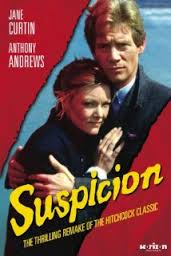
SUSPICION
UK, 1987, 96 minutes, Colour.
Anthony Andrews, Jane Curtin, Martin Clunes, Betsy Blair, Michael Hordern.
Directed by Andrew Grieve.
Suspicion is a update and more or less faithful remake of Alfred Hitchcock’s' 1941 classic Suspicion. The films screenplay is solidly based on the original - and was adapted by one of the stars, Jonathon Lynn (who plays Beaky) and Barry Levinson, writer and director of such films as Dinah, The Tin Men, Rain Man, Avalon. Anthony Andrews is more immediately sinister and under suspicion than Cary Grant in the original. Jane Curtain, an American, is much more robust than was Joan Fontaine-in the original.
The screen play is easily adapted to the present - but it is hard to respond to the relationship between Johnny and Lina because of the seeming lack of chemistry between the stars. Betsy Blair and Michael Hordern appear very briefly as Lina's parents. Vivian Pickles is the murder mystery novelist. Many of the sequences of the original are recreated - especially the sinister glass of milk sequence (which, of course, has much greater power in black and white photography). It was said at the time that censorship required Johnny not to be a villain. This 1987 production follows the lead of the original with Johnny being under suspicion but misunderstood.
1. Entertaining telemovie? Suspense and romance thriller? Remake of the original? Fidelity to the atmosphere and the screenplay of the original? Comparison of cast, updating in time?
2. Designed for the television audience? English locations, colour photography? The editing and pace - for suspicion? The echoing of the classic sequences - especially the glass of milk sequence, the dangerous driving?
3. The title, the focus on Johnny, Lena's attitudes? The audience sharing her attitudes - sufficient and insufficient evidence? Johnny being misunderstood?
4. Lena, in the train, quite and reclusive, reading psychology, at the riding? At home, the family introducing her to Johnny? Her going to church, going for the walk, his romantic advances and her response? Listening to her parents talk about her and her impulsive response to him? His standing her up? Coming to the dance, going for the drive, the proposal? Her Father's portrait? The wedding - and her father's disapproval? the lavish honeymoon, the lavish home? Her worry about money? The revelation about his not having a job? The gift of the chairs and the reconciliation with her father? Thinking he'd given up gambling and Beaky telling the story? Thinking he was employed and discovering from his cousin that he had taken the money? Her growing suspicions? Beaky and the drinking? Following them to the cliff - and relieved that Beaky was alive? The getting back of the chairs? Her ability and inability to respond to Johnny's dishonesty? Responding to his charm? Her father's death and the funeral, the will? Her growing suspicion, the news of Beaky's death, the police coming, the discussions with the novelist about
Polson? The glass of milk? Her decision to go to her mother, writing the letter and tearing it up? Her going for the drive, her fear? Johnny and the revelation of the truth - a future with him?
5. Johnny as the affluent conman - with a touch of the cad? Charm? Meeting Lina in the train, getting the money from her for the ticket? Getting photographed? Meeting Lina, going for the walk, in love with her? Coming to the dance? The proposal, the marriage? The honeymoon and the house? Borrowing money and the letter? The chairs and his reaction, selling them? Beaky's revelation of the truth? His reaction to Beaky? Buying the gifts - and the return of the chairs? The job, his failing and not telling Lina, telling lies about the reason? The drive - and his getting Beaky involved with the property development, saving his life in the car? Deciding to stop the business after the clash with Lina? Going to London - and the truth that he went to Liverpool and was not responsible for Beaky's death? Listening to the novelist stories? Her discussions about who was capable of committing murder? The glass of milk, his final reaction to Lina, the drive - and his confession of love and dependence on her?
6. The glimpse of Lina's parents, her mother and her concern? Her father and his behaviour at the meal, aristocrat? The ball, disdain for Johnny? The wedding, the gift of the chars, his death?
7. The novelist, friendship with Lina? The meal and the discussion about poisons? Her discernment of people able to commit murder? Looking after Lina in her collapse? telling Lina that she had told Johnny the stories? The meal, her brother the doctor and the discussion?
8. Beaky, his arrival, Johnny not telling Lina about him? The naive English wealthy man? The danger of the drinking? Friendship with Johnny, spilling the beans, taunting him about the chairs? Going into business, not understanding it? The danger on the cliff? The news of his death?
9. The police and the interrogations - Lina's response (and the audience sharing it)?
10. Satisfying romantic thriller? The experience of suspicion?
Published in Movie Reviews
Published in
Movie Reviews
Tagged under
Saturday, 18 September 2021 19:25
Sugar Baby/ Zuckerbaby
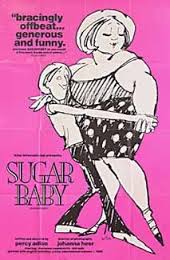
ZUCKERBABY (SUGAR BABY)
Germany, 1985, 86 minutes, Colour
Marianne Sagebrecht.
Directed by Percy Adlon.
Sugar Baby is written and directed by German Percy Adlon. After making a number of very serious films in Germany including Celeste, the story of Marcel Proust's housekeeper, Adlon made this frothy but serious comedy about a thirty eight year old overweight single woman who works in a funeral parlour, her taking five weeks holiday, her infatuation with a train driver, her complex searching out of his identity and finding out all about him, her affair with him for a fortnight - and its disastrous ending. Adlon had the advantage of actress Marianne Sagebrecht as his leading lady. She has a strong and striking screen presence. Adlon was to make his next two films with her in the U.S., Baghdad Cafe and Rosalie Goes Shopping.
The film is full of light touches, humorous presentations of Marianne and her new boyfriend, Huber, the married train driver. However, they also talk intimately and seriously about themselves, their past, their dreams, their frustrations. There are exuberant elements as Marianne comes alive in this new experience, culminating, in the rock 'n roll dancing which ends so hurtfully for her. The film is often tricksy in its cinematic style, especially the use of particular colours for sequences and the surreal atmosphere given to Marianne's train rides, the underground rail system, her reaction at the mortuary. The film was broadly adapted as an American telemovie, Baby Cakes with Ricki Lake (Hairspray) and Craig Schaffer.
1. Entertaining humane story? About men and women? About needs, love, frustration?
2. The German settings: the city, the underground rail system in all its detail, the mortuary, apartments and houses? The musical score - especially the use of the song, Sugarbaby? (The use of particular colours and monochromes for sequences - adding to the surreal atmosphere or distracting?)
3. The title, Marianne's discovery of the song, her memories, applying the name to Eugen Huber?
4. The opening mood: Marianne, her age, appearance, weight? Her eating at home? Her apartment, bed, television? The monotony of her going to work and back? The glimpses of work with the corpses? The monochrome of the train rides - and the continuous announcing of the next station and "stand clear"? The overall effect, her frustration in life?
5. Audience response to Marianne as a person? Her being late for work, confronting her boss, asking for the holiday, compromising with five weeks? Her going about her investigations with strong will? The rosters, the complaints department, befriending the officials, their explaining things to her, her reasons and motivations? Disguises, going into off limit areas? Her finally tracking down Huber, finding out the details about him, the youngest driver - the Sugarbaby?
6. Her preparation for the encounter, changing her clothes, buying the underwear? The scent? Changing her appearance? Following Huber, watching his apartment, discovering his family set-up, marriage - and the cantankerous wife?
7. The encounters with Huber, the railway station, the sweets? His attraction to her? The invitation - her setting it up, the frustration at his not coming, her grief? The suddenness of his appearance and his good reason for being late? His helping with the cooking, the fire, enjoying the meal?
8. The affair: reasons, motivations? Moral stances - amoral? The attraction, the sexual encounter? Marianne and her needing someone to mother - feeding Huber, the bubble baths, washing him? His response to her? His not being the tough macho type - but enjoying being mollycoddled?
9. The experiences together, their gradually talking? His telling his story, remembering how long he was married, the payments and instalments? His story, his non-explanations of sport and skills, his body building? Marianne's memory of
growing up, criticisms, her relationship with her parents? Frustrations? Death - and her working in the mortuary? The revelation of each to the other? The sexual intimacy? The good companionship? Bringing the best out of each other?
10. The build-up to the finale: their talking, the reflections about their work, the dead, dangers from suicides? Huber and his comparative inexperience?
11. The rock 'n roll dance, their going? The exhilaration of the dancing? The wife coming back, spying on them? The sudden attack on the dance floor? The humiliation and the violence against Marianne? Nobody stepping in to stop her, Huber standing back? His wife hitting him? Taking him off?
12. Marianne in the swimming, floating - as she was at the beginning? Dead, hurt coming to life? The enigmatic sequence of her standing, attractively dressed but with the black eye on the station? Her future - with or without Hubert? Her going back home?
Published in Movie Reviews
Published in
Movie Reviews
Tagged under